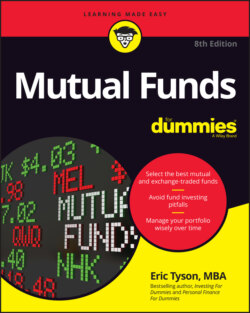Читать книгу Mutual Funds For Dummies - Eric Tyson - Страница 49
Watch out for these …
ОглавлениеNo doubt you hear critics in the investment world state their case for why you should shun funds. Not surprisingly, the most vocal critics are those who compete with fund companies.
You can easily overcome the common criticisms raised about fund investing if you do your homework and buy the better available mutual funds and exchange-traded funds, which I show you how to do in this book. Make sure that you consider and accommodate these factors before you invest in any fund:
Volatility of your investment balance: When you invest in funds that hold stocks and/or bonds, the value of your funds fluctuates with the general fluctuations in those securities markets. These fluctuations don’t happen if you invest in a bank certificate of deposit (CD) or a fixed insurance annuity that pays a set rate of interest yearly. With CDs or annuities, you get a statement every so often that shows steady — but slow — growth in your account value. You never get any great news, but you never get any bad news either (unless your insurer or bank fails, which could happen).Over the long haul, if you invest in solid funds — ones that are efficiently and competently managed — you should earn a better rate of return than you would with bank and insurance accounts. And if you invest in stock funds, you’ll be more likely to keep well ahead of the double bite of inflation and taxes. If you panic and rush to sell when the market value of your fund shares drops (instead of holding on and possibly taking advantage of the buying opportunity), then maybe you’re not cut out for funds. Stock fund investors who joined the panic taking place in late 2008 and early 2009 and sold got out at fire-sale prices and missed out on an enormous rebound that took place beginning in early 2009. The same scenario played out in early 2020 as stock prices dropped sharply and investors who then sold soon regretted doing so. Take the time to read and internalize the investment lessons in this book, and you’ll soon be an honors graduate from my Fund Investing University!
Mystery (risky) investments: Some funds (not those that I recommend) have betrayed their investors’ trust by taking unnecessary risks by investing in volatile financial instruments such as futures and options (also known as derivatives). Because these instruments are basically short-term bets on the direction of specific security prices (see Chapter 1), they’re very risky when not properly used by a fund. If a fund discloses in its prospectus that it uses derivatives, look to see whether the derivatives are used only for hedging purposes to reduce risk instead of as speculation on stock and bond price movements, which would increase risk.
Investments that charge fees that are too darn high: Not all funds are created equal. Some charge extremely high annual operating expenses that put a real drag on returns. (Again, you won’t find such funds on my recommended lists in this book.) I talk more about expense ratios and how to find great funds with low expenses in Chapter 7.
Taxable distributions: The taxable distributions that funds produce can also be a negative. When fund managers sell a security at a profit, the fund must distribute that profit to shareholders in the fund (dividends are also passed through). For funds held outside tax-sheltered retirement accounts, these distributions are taxable. I fill you in on taxes on funds in Chapter 10. Some people — especially brokers and self-anointed gurus who advocate investing in individual securities — argue that taxes on fund distributions are a problem big enough to justify the avoidance of funds altogether, especially for higher-tax-bracket investors. They don’t have to be. If you’re concerned about the money you’re investing outside of tax-sheltered retirement accounts, don’t worry — I have a solution: See my recommended tax-friendly funds in Chapters 11 through 13.
